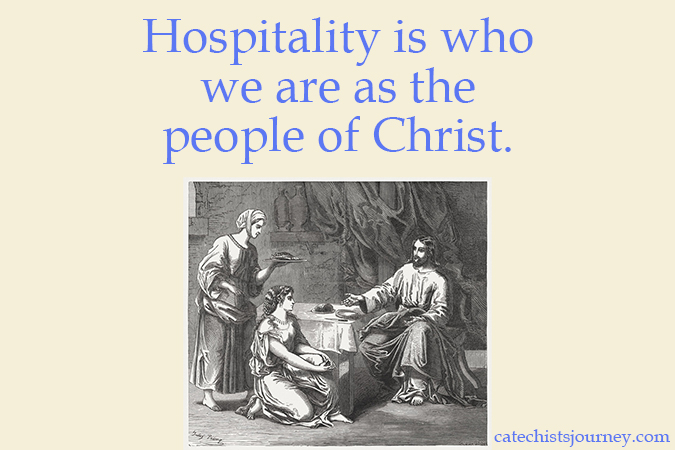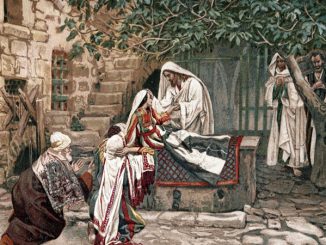
In the Gospel of Luke, we hear the story of Jesus’ visit to two sisters, Martha and Mary (Luke 10:38–42). Martha and Mary are presented in contrasting ways, but are they two sides of the same coin? Let’s take a look by exploring their story and its implications from a discipleship perspective.
Martha welcomes Jesus into her home. Martha’s sister Mary seats herself at the feet of Jesus to listen to him speak. Martha, who had been “distracted by her many tasks” (Luke 10:40) goes into the room where Jesus is speaking and demands that Jesus tell Mary to help her! But instead of doing as Martha asks, Jesus reminds her that she is worried and distracted by many things, but “there is need of only one thing.” (10:42). Mary had chosen the better place to be, with him.
This short story holds three lessons for all who are striving to be missionary disciples.
1. Set the stage for an encounter with Jesus through hospitality.
While many authors focus on the interaction that took place at Martha’s house, the opening lines of this story are incredibly significant from a discipleship perspective. Martha, with great boldness and generosity, throws open the doors of her home to Jesus. Martha and Mary’s encounter with Jesus would not have been possible without her hospitality. This is an important lesson for us: hospitality always sets the stage for an encounter with Jesus Christ. This is especially true of parish hospitality. Unfortunately, hospitality has become synonymous with coffee and donuts after Mass or relegated to a committee such as the stewardship committee or the hospitality committee. Not only has this mindset absolved us of the need to go out of our comfort zone to welcome others, but it also reinforces the mindset that hospitality is something only certain people do. Hospitality is who we are as the people of Christ. Martha reminds us that it is the responsibility of every person to help facilitate encounters with Jesus through generous living.
2. Be bold in prayer.
A striking element of this story is Martha’s attitude in addressing Jesus. Clearly frustrated with her sister’s lack of support in the kitchen, she speaks to Jesus with boldness and in fact, issues him a command: “‘Lord, do you not care that my sister has left me to do all the work by myself? Tell her then to help me.’” (Luke 10:40) While we may think that Martha was out-of-line in her tone and approach, Scripture reminds us that “we have access to God in boldness and confidence through faith in [Jesus Christ].” (Ephesians 3:12) We can approach God our Father in our prayers with the same spirit of boldness and confidence, although knowing that his will be done, not ours.
3. Dwell in the Word.
In life and in ministry, there will always be distractions and much to do. But we are human “be-ings” and not human “do-ings” for good reason. Martha, in her desire to make sure that everything was prepared and ready, forgets that the most important thing is to be present to Jesus. The greatest gift we have been given is Jesus’ presence in Sacred Scripture and the Blessed Sacrament. We can often forget that when we are busy with our various ministries. As disciples, one of the best ways to be nourished and strengthened is through Scripture. The Word is welcomed, not as a human word but the Word of God. It is God’s intended gift to us that gives us the strength to arise each day. Being nourished by the Word gives us the strength to focus and set aside distractions so that we can hear the voice of God in our daily lives.
At one time or another, we have all been a bit of a Martha in our walk of discipleship. The popular expression “missing the forest for the trees” is a good reminder to slow down and to set aside all other distractions so to be truly present to every person we meet.
What lessons of discipleship do you take from Martha and Mary?





Be the first to comment